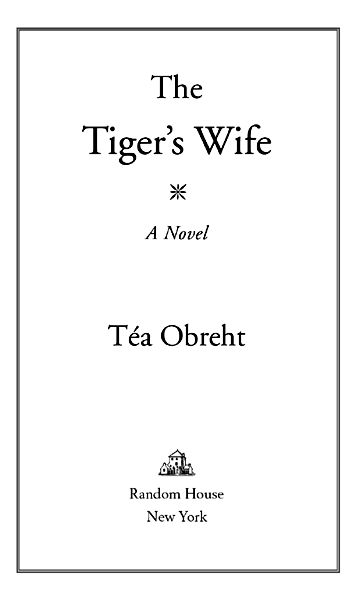The Tigers Wife is a work of fiction. Names, characters, places, and incidents are the products of the authors imagination or are used fictitiously. Any resemblance to actual events, locales, or persons, living or dead, is entirely coincidental.
Copyright 2011 by Ta Obreht
All rights reserved.
Published in the United States by Random House, an imprint of The Random House Publishing Group, a division of Random House, Inc., New York.
R ANDOM H OUSE is a registered trademark of Random House, Inc., and the colophon is a trademark of Random House, Inc.
Portions of this book appeared previously in The New Yorker in different form.
LIBRARY OF CONGRESS CATALOGING-IN-PUBLICATION DATA
Obreht, Ta.
The tigers wife: a novel / Ta Obreht.
p. cm.
eISBN: 978-0-679-60436-5
1. Women physiciansFiction. 2. OrphanagesFiction.
3. Grandparent and childFiction. 4. Family secretsFiction.
5. Balkan PeninsulaFiction. I. Title
PS3615.B73T54 2011
813.6dc22 2010009612
www.atrandom.com
Jacket design: Anna Bauer
Jacket illustration: Mary Evans Picture Library
v3.1
For tefan Obreht
Contents
In my earliest memory, my grandfather is bald as a stone and he takes me to see the tigers. He puts on his hat, his big-buttoned raincoat, and I wear my lacquered shoes and velvet dress. It is autumn, and I am four years old. The certainty of this process: my grandfathers hand, the bright hiss of the trolley, the dampness of the morning, the crowded walk up the hill to the citadel park. Always in my grandfathers breast pocket: The Jungle Book, with its gold-leaf cover and old yellow pages. I am not allowed to hold it, but it will stay open on his knee all afternoon while he recites the passages to me. Even though my grandfather is not wearing his stethoscope or white coat, the lady at the ticket counter in the entrance shed calls him Doctor.
Then there is the popcorn cart, the umbrella stand, a small kiosk with postcards and pictures. Down the stairs and past the aviary where the sharp-eared owls sleep, through the garden that runs the length of the citadel wall, framed with cages. Once there was a king here, a sultan, his Janissaries. Now the cannon windows facing the street hold blocked-off troughs filled with tepid water. The cage bars curve out, rusted orange. In his free hand, my grandfather is carrying the blue bag my grandma has prepared for us. In it: six-day-old cabbage heads for the hippopotamus, carrots and celery for the sheep and deer and the bull moose, who is a kind of phenomenon. In his pocket, my grandfather has hidden some sugar cubes for the pony that pulls the park carriage. I will not remember this as sentimentality, but as greatness.
The tigers live in the outer moat of the fortress. We climb the castle stairs, past the waterbirds and the sweating windows of the monkey house, past the wolf growing his winter coat. We pass the bearded vultures and then the bears, asleep all day, smelling of damp earth and the death of something. My grandfather picks me up and props my feet against the handrail so I can look down and see the tigers in the moat.
My grandfather never refers to the tigers wife by name. His arm is around me and my feet are on the handrail, and my grandfather might say, I once knew a girl who loved tigers so much she almost became one herself. Because I am little, and my love of tigers comes directly from him, I believe he is talking about me, offering me a fairy tale in which I can imagine myselfand will, for years and years.
The cages face a courtyard, and we go down the stairs and walk slowly from cage to cage. There is a panther, too, ghost spots paling his oil-slick coat; a sleepy, bloated lion from Africa. But the tigers are awake and livid, bright with rancor. Stripe-lashed shoulders rolling, they flank one another up and down the narrow causeway of rock, and the smell of them is sour and warm and fills everything. It will stay with me the whole day, even after I have had my bath and gone to bed, and will return at random times: at school, at a friends birthday party, even years later, at the pathology lab, or on the drive home from Galina.
I remember this, too: an altercation. A small group of people stand clustered around the tigers cage. Among them: a boy with a parrot-shaped balloon, a woman in a purple coat, and a bearded man who is wearing the brown uniform of a zookeeper. The man has a broom and a dustpan on a long handle, and he is sweeping the area between the cage and the outer railing. He walks up and down, sweeping up juice boxes and candy wrappers, bits of popcorn people have tried to throw at the tigers. The tigers walk up and down with him. The woman in purple is saying something and smiling, and he smiles back at her. She has brown hair. The dustpan keeper stops and leans against the handle of his broom, and as he does so, the big tiger sweeps by, rubbing against the bars of the cage, rumbling, and the keeper puts a hand through the bars and touches its flank. For a moment, nothing. And then pandemonium.
The tiger rounds on him and the woman shrieks, and suddenly the dustpan keepers shoulder is between the bars, and he is twisting, twisting his head away and trying to reach for the outer railing so that he has something to hold on to. The tiger has the dustpan keepers arm the way a dog holds a large bone: upright between his paws, gnawing on the top. Two men who have been standing by with children jump over the railing and grab the dustpan keepers waist and flailing arm and try to pull him away. A third man jams his umbrella through the bars and pushes it over and over again into the tigers ribs. An outraged scream from the tiger, and then it stands up on its hind legs and hugs the dustpan keepers arm and shakes its head from side to side, like its pulling on rope. Its ears are flattened, and it is making a noise like a locomotive. The dustpan keepers face is white, and this entire time he hasnt made a sound.
Then suddenly, its no longer worth it, and the tiger lets go. The three men fall away, and there is a splatter of blood. The tiger is lashing its tail, and the dustpan keeper is crawling under the outer railing and standing up. The woman in purple has vanished. My grandfather has not turned away. I am four years old, but he has not turned me away, either. I see it all, and, later, there is the fact that he wants me to have seen.
Then the dustpan keeper is hurrying our way, winding a piece of torn shirt across his arm. He is red-faced and angry, on his way to the infirmary. At the time, I believe this is fear, but later I will know it as embarrassment, as shame. The tigers, agitated, are lunging back and forth across the grate. The keeper is leaving a dark trail on the gravel behind him. As he passes us, my grandfather says: My God, youre a fool, arent you? and the man says something in reply, something I know not to repeat.
Instead, shrill and self-righteous in my lacquered boots, brave because my grandfather is holding my hand, I say: Hes a fool, isnt he, Grandpa?
But my grandfather is already walking after the dustpan keeper, pulling me along, calling for the man to stop so he can help him.

THE FORTY DAYS OF THE SOUL BEGIN ON THE MORNING after death. That first night, before its forty days begin, the soul lies still against sweated-on pillows and watches the living fold the hands and close the eyes, choke the room with smoke and silence to keep the new soul from the doors and the windows and the cracks in the floor so that it does not run out of the house like a river. The living know that, at daybreak, the soul will leave them and make its way to the places of its pastthe schools and dormitories of its youth, army barracks and tenements, houses razed to the ground and rebuilt, places that recall love and guilt, difficulties and unbridled happiness, optimism and ecstasy, memories of grace meaningless to anyone elseand sometimes this journey will carry it so far for so long that it will forget to come back. For this reason, the living bring their own rituals to a standstill: to welcome the newly loosed spirit, the living will not clean, will not wash or tidy, will not remove the souls belongings for forty days, hoping that sentiment and longing will bring it home again, encourage it to return with a message, with a sign, or with forgiveness.












